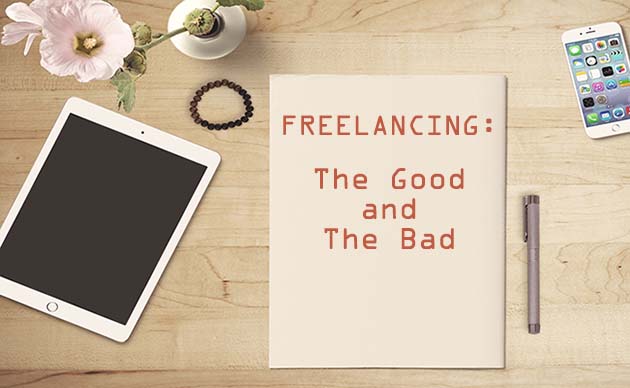Freelancers make up a big portion of today’s workforce, and the number of freelancers will most likely continue to grow. According to the Brooklyn New York-based nonprofit Freelancer’s Union, “More than one in three Americans freelanced last year, and in five years, the independent workforce grew by 7%.” As freelancing continues to grow in popularity – and in its level of legitimacy and recognition – there also seems to be a growing sense of romanticism surrounding it. Lately I am seeing more and more articles that seem to ignore a harsh reality: freelancing is actually a necessity for many of us who might be under-employed, or laid-off from our traditional jobs – or are freelancing on the side just to make ends meet.
It’s a good idea to be wary of articles that glamorize the freelance lifestyle with headlines such as “How I landed a $20K client within 1 month of becoming a freelancer.” (not kidding.. I’ve seen headlines like this). Articles like that run the risk of portraying freelancing as something that’s as easy as hanging up our virtual “Open For Business” signs and then waiting for the cash to come flooding in.
Attempting to make a full-time living as an independent worker is at first exhilarating…
then challenging…
and then reality truly kicks in.
Having experienced first-hand what is like to be a full-time freelancer – both the good and the bad – this article details my experience and perspective on the freelancing life.
6 reasons why freelancing rocks (the Good)
- Having freedom to determine your own schedule (for the most part)
- Getting to choose which projects to work on and having a chance to work on a wide variety of projects
- It’s a great way get extra money for vacations, save a little money into a retirement account, etc.
- Being able to work from almost literally any location, and especially having the freedom to work from home
- Experiencing the opportunity to learn something new every single day
- You get to choose who you want to work with
6 reasons why freelancing sucks (the Bad)
- You get absolutely no benefits
- Having to deal with the near-constant cycle of applying to projects and jobs
- Clients sometimes (actually, often) have unrealistic expectations of freelancers
- Lack of an ongoing connection with others is a real risk with this lifestyle and career path
- Managing time can be a real challenge
- Lack of a steady paycheck or other reliable, predictable means of income
6 reasons why freelancing rocks (the Good)
1. Having freedom to determine your own schedule (for the most part)
This is one of the best things about freelancing (it especially applies if you are a full-time freelancer without the time restrictions of a “regular job”, even a regular part-time job). It’s wonderful to have the freedom to wake up when you want to, start your workday when you want to, and so on. It’s also wonderful to be able to take a day off or a sick day when it’s convenient for you – and not have to ask anyone’s permission to do so.
What a refreshing feeling it is to be able to step out for lunch, run to an appointment or to simply get some errands done whenever I want to! And to not have to answer to anybody else about it or to live life within the confines of a time clock… now that’s living!
A word of caution: this freedom can bring along with it a price. That price being the tendency (if you’re anything like me in this sense) to struggle with setting limits and boundaries around when to stop working for the day. I can’t count how many times I’ve told myself “I am NOT working late again today!” – only to find myself chipping away at an issue on a client’s website at 8:30 pm.
To do this on a regular basis isn’t fair to your family or to you. So be firm in setting limits, and it’s a good practice to try stopping work around the same time each day.
Disclosure: There is an affiliate link below. We only recommend products, brands or services that we are personally familiar with and are very happy with!
2. Getting to choose which projects to work on and having a chance to work on a wide variety of projects
This is one of the really cool things about freelancing. Since I started my business a few years ago I have had the opportunity to work with a variety of clients on a wide range of projects, websites, apps, plugins, etc. I get to work on something new every day and it absolutely never ever gets boring.
In between my larger (more long-term) projects I’ve been seeking out a few smaller projects here and there, such as designing a logo for a solopreneur, creating an art gallery page for a client and helping a web designer friend troubleshoot some conditional logic issues she was having with her WordPress website’s Ninja forms.
One thing I made sure to include with my dealings with clients was a freelancer contract. It is very important to cover yourself legally when entering into any type of freelancing/independent contracting scenario. This 10-page Independent Contractor template is an excellent way to cover yourself and have peace of mind in those types of situations. And it contains legal language you can use to cover yourself whether you are the freelancer being hired or you’re the one doing the hiring! Note: it is also known as “the Freelance Contract”, “Non-Employee Contract”, and the “Virtual Assistant (VA) Agreement”.
3. It’s a great way get extra money for vacations, save a little money into a retirement account, etc.
I’m being 100% honest here when I say that (in my opinion) for at least the first 6 months to a year of your freelancing business you should have some form of additional, steady and reliable income flowing into your household. Without that, you might find yourself draining your bank account or other accounts, such as money you had set aside for retirement. I personally made this mistake and now am in the position of having to try to build up part of my retirement account all over again.
That being said: if you do have other streams of income and you are freelancing on the side – kudos to you, because it is an excellent way to generate extra money.
4. Being able to work from almost literally any location, and especially having the freedom to work from home
The beauty of online work is that it can be done from anywhere. I love working from home and relish the fact that I don’t have the 1 hour+ commute that I used to have. Not having to deal with traffic or cleaning off my car in the winter, and having that extra time for other things is a huge perk of the freelance life.
And there’s also the fact that my car lasts longer, I spend a LOT less on gas nowadays, and I don’t spend as much money on lunches (or clothes either… now that I come to think of it).
Another related benefit of being an online service professional is the (potential) ability to work with clients from all over the world; your customer base doesn’t have to be limited by your local geographic area.
5. Experiencing the opportunity to learn something new every single day
After more than a decade and a half of working at a “9 to 5” job at a Fortune 50 corporation, I am not too proud to say that I had fallen into a rut. Slowly as the years ticked away I had come to rely too heavily upon my employer to push me along my career path, to train me and to (hopefully) advance me along in the company. My sense of initiative was dwindling as my comfort level was rising.
But then came the layoffs.
Suddenly I was forced into a position where I had to re-learn how to learn… and fast.
At first this struck me as a shock and an unsurmountable challenge; to suddenly need to brush up on rusty skills and to take other skills off the shelf and dust them off. Not to mention all of the NEW skills that I needed to learn in order to start and run my own freelance web design business. But as soon as I started to really get into learning new things, I forced myself to making it a daily habit, and now barely a day goes by that I can honestly say I haven’t learned something new, or improved my existing skills in some way.
Having a freelance business means (in the web design arena) having to jump in and learn skills that span across many different career paths, from web developer to SEO manager.
So, this item could be a freelancing PRO or a CON, depending upon your attitude towards learning. If you are not adept at learning on your feet as you go along you will probably not survive this kind of life, and should re-think becoming a freelancer.
6. You get to choose who you want to work with
One of the good things about being a freelancer is the freedom to work with others of your own choosing. You decide upon which clients you want to pursue, what gigs to apply to, and which business partners to form alliances with. At one point or another you’ll probably need to seek out the help of other freelance professionals, too.
One of the most positive aspects of the freelance life for me is getting to work with other creative people like web designers, writers, programmers and others who are in a similar situation.
They get it .. they understand this way of life.
I seek out and gravitate towards creative people and work with the ones I feel a true connection with.
As for clients: most have been pretty decent to work with, but the few that weren’t .. well I just finished the project that I was working on for them and left it at that. I wasn’t obligated to continue working with them.
6 reasons why freelancing sucks (the Bad)
1. You get absolutely no benefits
Depending upon your family situation this freelancing con could stop you from even considering freelancing at all. Let me emphasize that if you have a “regular” job that includes benefits and are considering freelancing on the side – WOW, go for it! What are you waiting for??
You might be in a situation where your partner or spouse has a job that provides benefits such as health insurance and a 401K retirement account. If you do, you are very fortunate. However, if you are considering freelancing full-time with no other means of acquiring benefits, I would like to strongly caution you before you make that leap.
Because (as far as I am aware) freelancing comes with:
- No medical coverage (no portion of it paid by someone other than yourself)
- No life insurance or other similar coverage
- No disability plan
- No retirement plan or pension plan
- No paid sick days
- No paid leave
- No paid training
- No paid-for equipment
- No … etc. (you get the picture)
If you have a family or health issues or are basically a living person, then all of the above benefits truly matter … not having them I mean.
2. Having to deal with the near-constant cycle of applying to projects and jobs
From a personal perspective as a freelancer, the never-ending cycle of having to prove myself and my skills over and over (and over) again is at best draining, and at worst demoralizing. Especially during my first year or so of freelancing I found myself constantly searching for new jobs and clients, constantly sending proposals, and constantly interviewing (rinse and repeat).
Not fun.
Unless you’ve been fortunate enough to acquire several reliable contracts where you can charge a steady fee (for example, in a situation where you charge a consistent monthly fee for website maintenance services) – you will need to keep hustling nearly all of the time to stay in business.
Here’s another thing that not too many pie-in-the-sky articles about the wonders of freelancing will mention: all that time spent hustling, searching and applying? It’s all unpaid time. And since time = money in this kind of business, that can add up to a lot of missed $$.
One other thing on this subject: if you choose to scour through online freelancing platforms to look for new jobs and clients, please be cautious. There’s a chance you could encounter scam artists and fake clients on any type of platform such as this. New freelancers are especially vulnerable because they might not know what to watch for when interacting with others on online freelancing platforms such as Upwork, Guru, Freelancer, People Per Hour, and so on.
I ran into quite a few potential scam clients myself when I was first starting my business.
That being said – it’s usually pretty easy to spot a fake client, and there are tons of honest and trustworthy real clients to be found on the major, more well-established online freelancing platforms. Personally I have had some great experiences with clients especially on Guru and Upwork. I’ve also had some experience with another freelancing platform that might not be as well known that’s called LinkedIn ProFinder. I’m a big fan of LinkedIn, generally speaking, so I thought I would give their freelance platform a try.
3. Clients sometimes (actually, often) have unrealistic expectations of freelancers
As someone who has been freelancing for a few years now, I have built up a group of repeat clients, whom I have grown to know and respect. That being said: I often run into the situation where certain clients have begun to rely on me for things that not truly in my wheelhouse and/or I have no interest in. It is impossible to be all things to all people, so I have recently learned how to say “no”. If I’m feeling particularly ambitious at the time, however, I might take on a project that I’m not completely comfortable with as long as I can outsource some of it. It helps to network with other web designers in these instances.
Sometimes clients expect freelancers to have the knowledge and background to take care of EVERYTHING for them. There is so much pressure to know so much about SO many different things. Some clients expect freelancers (in my line of work) to know not only web development, coding, web design, image-editing, etc. but also to become experts in SEO, marketing, writing web copy, project management, release management, posting on social media – and sometimes even technical server-related troubleshooting!
There’s been a few times I’ve had to explain things such as “I’m a web designer, but no – I am not a server administrator so I can’t control if your web hosting provider’s server is down.” I’ve also had to decline some offers from clients to manage their social media accounts. It might be hard for some people to understand unless they are in that line of work, but there is literally a whole career path out there called “Social Media Manager”. I mean it can take such a large amount of time to manage several social media accounts that it can take enough hours to fill a full-time work week. Another service that I have found myself getting into more and more these days is helping clients to optimize their websites for search. I actually do this as part of building any website, so I don’t mind – but again, being an “SEO Manager” is often considered a separate career path.
To expect a freelancer to be a web designer, web developer/coding expert, server admin, SEO manager and social media manager all rolled into one … sorry, but that’s asking too much.
4. Lack of an ongoing connection with others is a real risk with this lifestyle/career path
I suppose if you’re a lone-wolf type of person, this might not be much of a drawback. But for folks like me who really thrive on human connection, this is a major drawback – especially if you are freelancing full-time. Not gonna sugar-coat it… it can get incredibly lonely at times.
Working with others as within a team setting brings with it certain intrinsic social benefits; a built-in support system being one of them. Especially in larger companies it can feel like belonging to a “village” of sorts. As I can attest to from my 9-to-5 working days, most people derive their social network primarily from their place of employment, especially since the majority of their time is spent working (as opposed to engaging in other social situations).
So, it is a nice feeling to be part of a “village” and to have a place within that community structure and to have that sense of ongoing familiarity with your coworkers. But with full-time freelancing it’s like being stuck outside the gates of the village looking in.. all by yourself.
Side Note: there is the possibility of joining some type of co-working community where you can go to an office (still as an independent worker or freelancer) and work alongside others who are in a similar situation. I worked on a website a while back for a company based on the west coast of the USA called Embark that is one such co-working community. I haven’t tried it, but “co-working” seems like a really good idea.
5. Managing time can be a real challenge
If you are a freelancer who works primarily from home, it is often difficult to draw boundaries around your work time VS your own personal time. In order to stay competitive and please and/or impress my clients I have often answered calls and emails late into the evening (sometimes even as late as 10 pm or later). Truth be told, I always feel like I’m on call, checking my email at night, on weekends and even during my so-called “vacations.”
Additionally, as a person who builds websites as my primary professional service, if there is a problem on a client’s website and it’s 11 pm … well, guess who they call? It could be a case (and has been the case) where the client’s web hosting provider’s server went down and it had absolutely nothing to do with me.
Sill got the call at 11 pm.
But I didn’t have to answer my phone … that part was on me! However, even on a normal run-of-the-mill day I find myself working from morning until at least 7 – 8:00 pm most nights, and I usually put in a good ½ day on Saturdays. My advice: don’t do this. Seriously, I need to start prioritizing and managing my time better.
6. Lack of a steady paycheck or other reliable, predictable means of income
This last item is probably a deal-breaker for many folks out there who might be considering the leap into full-time freelancing and/or opening up their own small business as an online “solopreneur”. I am not going to sugar-coat this item either: at the beginning, until you build up a steady stream of clients and at least one stream of recurring income – you absolutely will need a backup form of money coming into your household.
This point is SO important that I am repeating what I stated earlier in this article.
As the excellent small business and career informational website The Balance points out, it might be necessary to keep your regular job and launch your freelance venture on the side until you establish some level of stable income.
If you do not have this other source of income while building your freelance business, there is a good chance you could wind up draining your money reserves, retirement accounts, and whatever you have saved in your checking account. I know this from experience.
Establishing yourself as a freelance professional or as a small business entity (whatever you choose to be called) is a long-term adventure and will probably not come close to paying the bills for at least 6 months, or longer. This is a reality that some bloggers tend to gloss over. It would be disingenuous for me not to stress this point, because when I was starting out I read far too many blog posts about freelancing that gleefully boasted about how easy it is to make money in this manner. Essentially they kept saying, just apply to jobs and projects and you’ll practically be handed big money accounts…
Wheeee! Isn’t freelancing easy?!
Nope, not for a single minute.
But is it worth it?
That is for you to decide for yourself, and I wish you the best of luck if you do decide to take the freelancing plunge. Please let me know in the comments what your experience has been in this arena – and how you like(d) it. Thank you for reading!








